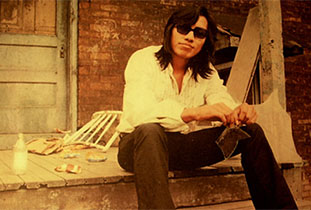04.07.2013 / Montreux Jazz Festival
Rodriguez

Show information
www.sugarman.orgwww.montreuxjazzfestival.com
 It’s one of 1970s underground rock’s most unusual stories: the tale of an obscure debut LP by a Detroit singer-songwriter becoming a source of hope and inspiration to the anti-Apartheid movement in South Africa. Now, the story of Rodriguez and his cult album Cold Fact is the basis for Searching For Sugar Man, a revelatory and compelling documentary by filmmaker Malik Bendjelloul.
It’s one of 1970s underground rock’s most unusual stories: the tale of an obscure debut LP by a Detroit singer-songwriter becoming a source of hope and inspiration to the anti-Apartheid movement in South Africa. Now, the story of Rodriguez and his cult album Cold Fact is the basis for Searching For Sugar Man, a revelatory and compelling documentary by filmmaker Malik Bendjelloul. It’s a film about hope, inspiration and the resonating power of music, and that music can be heard on the Original Motion Picture Soundtrack, available 23rd July through Sony Legacy Recordings and Light In The Attic Records. Comprising tracks from Cold Fact and its 1971 follow-up Coming From Reality (reissued to critical acclaim in 2008 and 2009, respectively), the soundtrack begins with the otherworldly Sugarman and acts as a primer to this long-overlooked musician’s fusion of gritty funk, political poetry and blissful psych-folk.
Searching for Sugar Man was a big hit at this year’s Sundance Film Festival where it won the world documentary audience award and a special jury award, and it received fantastic reviews at this year’s SXSW and Tribeca film festival. The film will have its European premiere at the 2012 Sheffield Doc/Fest where it will open the festival on 13 June (www.sheffdocfest.com) and will be showing at the BFI in London on 30 June.
The Mexican-American singer-songwriter Sixto Diaz Rodriguez was discovered in a Detroit bar by producers Dennis Coffey and Mike Theodore. They recorded a 1970 album that they believed was going to secure his reputation as one of the greatest recording artists of his generation. Instead, Cold Fact bombed and the Rodriguez disappeared into obscurity, even being subject to rumours that he had committed suicide by setting himself on fire onstage.
The album took on a life of its own when a bootleg recording found its way into apartheid-era South Africa. Banned by the government, the album became a country-wide phenomenon over the next two decades, and the soundtrack to a resistance movement of liberal African youth. Back in Detroit, living a hardscrabble life, Rodriguez was totally unaware that he was not just a folk hero but a household name thousands of miles away.
Eventually, two South African fans then set out to find out what really happened to their hero, and their investigation led them to a story more extraordinary than any of the many myths they’d heard. Their story forms the basis of Searching For Sugarman.
Go back
